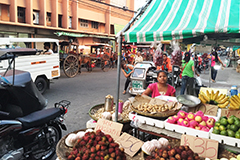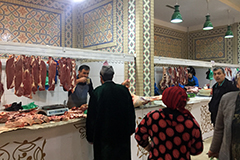Interview on the Impact of COVID-19 with Research Fellow Yamada Eiji
2021.01.06
The 2019 novel coronavirus pandemic (hereinafter, COVID-19) has had a variety of impacts around the world. How has it affected the lives of people in developing countries who rely on remittances sent from migrant workers in other countries? To find out the answer to this question, we asked Yamada Eiji, research fellow at the JICA Ogata Sadako Research Institute for Peace and Development (JICA Ogata Research Institute), how research is being conducted under these unprecedented conditions.

—How has COVID-19 impacted your fields of expertise, urban economics and environmental economics?
Since the start of pandemic, telecommuting has attracted attention from a wide range of economists, including urban economist. While there had been research on the urban economic implications of telecommuting even before the start of pandemic, I think the pandemic significantly expanded the audience for this area of research. Debates are going on regarding how the shape of cities will change, in both theoretical and empirical terms, using data from before and after the pandemic. There are many important research questions, including how concentration and congestion in cities will change, what industries and occupations will allow people to work from home, and how things will differ between developing and developed countries as telecommuting becomes more prevalent.
The pandemic has also had a major impact on the global environment. One of most eye-catching phenomena regarding the environmental impact of COVID-19 has been the temporary reduction of air pollution in numerous cities across China, Europe, the US, and elsewhere. The main cause of this unprecedented reduction was city lockdowns carried out around the world to combat the COVID-19 pandemic. Nowadays, we can get satellite data that lets us monitor air pollution in real time, and papers using that data have come out. However, this sharp decline of pollution is only temporary and does not necessarily indicate a long-term improvement in the environment. For example, air pollution temporarily decreased in China as well due to strong measures to contain the spread of the virus. However, air pollution could rebound along with the economic recovery, potentially reaching worse levels than before. The COVID-19 pandemic struck during a US-China standoff that had the potential to change the future positioning of Chinese products within global supply chains. If there had been no pandemic, China would certainly have been heading for tighter environmental regulations, including the recent declaration of decarbonization goals by the leader of China. However, the necessity of a quick economic recovery could provide strong motivation for looser enforcement of environmental regulations with the aim of reducing manufacturing costs. Although air pollution has decreased due to the pandemic, this effect might only last a short period of time. In the long run, the pandemic might instead divert China from its course toward tighter environmental regulations, making things worse in the future compared to if the pandemic had not occurred.
—What issues are involved in doing research during a pandemic?
To do research, first and foremost, data is indispensable; but for some of the research I’m involved in, one practical challenge is the difficulty of doing face-to-face surveys. I had collected data on household finances in the Philippines in 2016 and 2017, so I was prepared to follow up on how finances in the same households during the COVID-19 recession. However, a local consultant who was working with us on these surveys said it would be difficult to do face-to-face surveys any time soon. In our surveys, we ask detailed questions related to households’ economic behavior, and the concepts behind those questions need to be explained. Interviews usually take hours to complete, and it is difficult to get people to read the questions and provide answers online, for example. Switching suddenly from face-to-face to telephone surveys means that we can barely ask questions for 20 minutes before the respondents get tired of it. That limits the scope of the questions we can ask, so we are looking into how our surveys can be carried out in the future. The microdata used in economics usually requires thousands of samples from among the general public, who are not trained researchers. So conducting surveys at that scale is quite difficult under the current situation.

Data was collected on household finances in the Philippines in 2016 and 2017
However, there are other ways to continue our research. As part of the "Study on Remittances and Household Finances in the Philippines and Tajikistan", a research project of the JICA Ogata Research Institute, we have been conducting a survey using telephone interviews in Tajikistan in collaboration with the World Bank. This telephone-based survey of households is part of a program called “Listening to Tajikistan” that was launched by the World Bank in 2015. It continuously tracks the economic situations of 800 households in Tajikistan once per month. JICA Ogata Research Institute started participating in the survey in 2017, and we have been able to continue the survey during the COVID-19 pandemic just as we did before, without any problem. The survey respondents have been cooperating with telephone interviews that are nearly an hour in length. This is possible because we’ve built good relationships with the respondents through repeated interviews conducted over a long period of time. The interviews have been done by telephone since the early stages of the study, mainly to reduce survey costs and the time required to process the data collected from all over Tajikistan. Thanks to the fact that the survey has been done by phone, we have been able to continue collecting data as before, even after the pandemic started. As a result, according to the World Bank, Tajikistan and Uzbekistan are the only countries where they’ve been able to track the number of same households on a monthly basis both before and after the COVID-19 outbreak. It is likely that this data will show some interesting changes between before and after the pandemic.
—Please tell us about your current research efforts and future prospects.
At the stage when the COVID-19 pandemic started, around March and April of 2020, I started thinking about what I could do as a researcher. Waiting was unavoidable since I couldn’t immediately get new data and it was still going to take some time to obtain the telephone survey data from Tajikistan, so I did what I could and wrote a few papers.

The research project is estimating the impact of the COVID-19 pandemic on Tajikistan household finances
A paper titled “Projection of the Effects of the COVID-19 Pandemic on the Welfare of Remittance-Dependent Households in the Philippines”, which I wrote together with Executive Senior Research Fellow Shimizutani Satoshi and Research Fellow Murakami Enerelt, was published in the journal Economics of Disasters and Climate Change. In that paper, we estimate the potential impact of the COVID-19 pandemic on the finances of Philippine households that are dependent on foreign remittances and how much those remittances from abroad will decrease. The World Bank and the Asian Development Bank have also calculated how much foreign remittances to the Philippines would decrease at the aggregate level using different methods, and they came to the same conclusion of about a 20 percent reduction. Another paper of ours titled “The Potential Impact of the COVID-19 Pandemic on the Welfare of Remittance-Dependent Households in the Philippines” was published in COVID Economics: Vetted and Real-Time Papers, a collection of economic papers focused on the COVID-19 pandemic, published by the Centre for Economic Policy Research.
We also wrote papers about the Philippines and Tajikistan, titled “The COVID-19 Pandemic, Remittances and Financial Inclusion in the Philippines” and “Remittances, Household Welfare and the COVID-19 Pandemic in Tajikistan”, for which we used the data we had originally obtained to predict how much the financial inclusion of remittance-dependent households would be impacted in 2020. These papers clarify the relationship between macroeconomic conditions in the destination countries of the migrants and the amount of money the migrants send back to their home countries using data obtained prior to the COVID-19 pandemic. They also predict how much the value of foreign remittances will be affected based both on 2020 and 2021 GDP forecasts for each country produced by the International Monetary Fund (IMF), World Bank, and Organisation for Economic Co-operation and Development (OECD) and on the assumption that the aforementioned relationship remains the same. Furthermore, we examined how much those households’ consumption, educational expenditures and access to bank accounts would change if the value of remittances received was reduced.
We have started to obtain Tajikistan telephone survey data for the period after the COVID-19 pandemic began, so we hope to use that data for our research going forward. Russia is where most migrant workers from Tajikistan go, but because the borders closed in March 2020, people have been unable to travel to Russia, and those who had already gone to Russia have been unable to return to Tajikistan. Foreign remittances fell sharply in April and May but have since returned to nearly their original level. We will analyze the data to see if that’s because the people who remained in Russia have resumed work or if it’s because those who were unable to work abroad before are now able to travel. We also want to examine whether people have had enough food despite the reduction in foreign remittances, whether they have enough fuel with winter coming, and, for those who make a living from farming, how much their buying of farming supplies has been impacted. Additionally, we want to take a long-term perspective that includes examining what happens to households that are dependent on foreign remittances six months or a year after the start of the COVID-19 pandemic. The use of microdata will undoubtedly reveal how the degree of the impact from the COVID-19 pandemic differs across different people within the same country, Tajikistan. We want to continue our research in order to learn what factors are responsible for those differences.
■ Profile
Completed a Master’s degree from the Graduate School of Economics at the University of Tokyo and a PhD in economics from Institut d'études politiques de Paris (Sciences Po Paris). Joined the Japan Bank for International Cooperation (JBIC) in April 2008 (which merged with JICA in October 2008) and has held positions in South Asia Division 5 (managing Bangladesh-related matters) of the South Asia Department and in the Financial Risk Management Division of the General Affairs Department. Has been in his current position since August 2014.

事業事前評価表(地球規模課題対応国際科学技術協力(SATREPS)).国際協力機構 地球環境部 . 防災第一チーム. 1.案件名.国 名: フィリピン共和国.

事業事前評価表(地球規模課題対応国際科学技術協力(SATREPS)).国際協力機構 地球環境部 . 防災第一チーム. 1.案件名.国 名: フィリピン共和国.

事業事前評価表(地球規模課題対応国際科学技術協力(SATREPS)).国際協力機構 地球環境部 . 防災第一チーム. 1.案件名.国 名: フィリピン共和国.

事業事前評価表(地球規模課題対応国際科学技術協力(SATREPS)).国際協力機構 地球環境部 . 防災第一チーム. 1.案件名.国 名: フィリピン共和国.

事業事前評価表(地球規模課題対応国際科学技術協力(SATREPS)).国際協力機構 地球環境部 . 防災第一チーム. 1.案件名.国 名: フィリピン共和国.
scroll